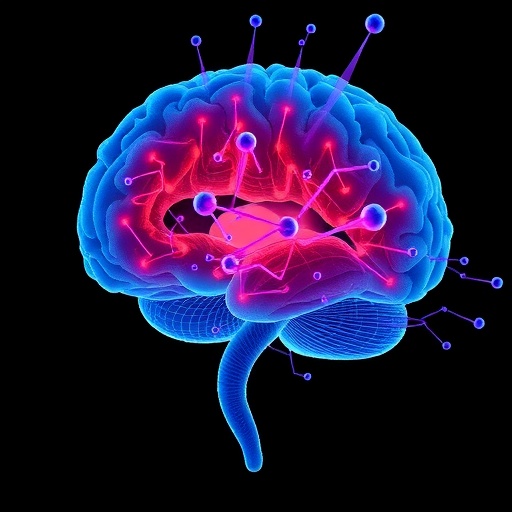In a groundbreaking study that could reshape the way chronic neurological conditions are managed, scientists from Georgetown University and American University have presented compelling evidence that a low-glutamate diet significantly alleviates migraine symptoms in veterans suffering from Gulf War Illness (GWI). This research, unveiled at the prestigious Neuroscience 2025 meeting in San Diego, offers the first direct proof linking symptom improvement to measurable changes in brain structure, specifically a reduction in cortical thickness, marking a major advancement in our understanding of diet-brain interactions and their therapeutic potential.
Gulf War Illness is a complex and chronic multi-symptom condition afflicting more than 25% of veterans who served in the 1990-1991 Gulf War. Characterized by debilitating symptoms that span musculoskeletal pain, gastrointestinal issues, fatigue, cognitive dysfunction, and notably severe migraine headaches, GWI has long challenged clinicians due to its elusive etiology and limited treatment options. The prevailing hypothesis attributes these symptoms to exposure to neurotoxic chemicals during the conflict, leading to persistent neuroinflammation and excitotoxicity. This new study illuminates one dietary factor—glutamate—that exacerbates these pathological processes and offers a novel, non-pharmacological means to counteract them.
Glutamate is the chief excitatory neurotransmitter in the central nervous system, playing an essential role in synaptic transmission and neural plasticity. However, excessive extracellular glutamate can trigger excitotoxicity, a pathological overstimulation of glutamate receptors causing neuronal damage and death. In the context of GWI, this excitotoxicity is thought to perpetuate inflammation and oxidative stress, creating a vicious cycle that intensifies neurological symptoms, including migraines. Notably, glutamate is abundant not only in certain natural foods like tomatoes and mushrooms but also in processed foods, where it is commonly added in the form of monosodium glutamate (MSG) and other flavor enhancers.
In this innovative experimental study, researchers first conducted neuroimaging analyses comparing veterans with GWI and healthy controls to identify structural brain differences correlated with migraine prevalence. They discovered a significant increase in cortical thickness within the right visual cortex of the GWI cohort. This finding aligns with prior migraine research linking cortical thickening in visual areas to migraine with aura, underscoring a possible neuroanatomical biomarker for disease severity and symptomatology.
Building on these initial insights, participants diagnosed with Gulf War Illness adhered to a low-glutamate diet for a month, meticulously designed to minimize intake of both natural and additive sources of glutamate. Follow-up MRI scans revealed a remarkable reduction in cortical thickness in the right visual cortex post-diet intervention, signifying neural plasticity and potential reversal of pathological cortical alterations. This morphological change was paralleled by a substantial clinical improvement: migraine incidence plummeted from over 50% pre-intervention to less than 20% after only four weeks on the diet.
The relationship between cortical thickness and migraine frequency observed in this study advances the theory that neural excitability and structural brain changes may be modulated by dietary glutamate levels. Furthermore, the reduction in migraine symptoms was accompanied by improvements in other hallmark GWI symptoms, including widespread pain, fatigue, mood disturbances, and cognitive deficits. These multi-dimensional benefits reinforce the notion that glutamate-driven excitotoxicity and neuroinflammation have far-reaching effects beyond migraine pathophysiology in this patient population.
The dietary intervention stems from pioneering work by Dr. Kathleen Holton, a nutritional neuroscientist at American University, who developed the low-glutamate diet as a targeted strategy to curb glutamate intake and mitigate neurological symptoms. This diet eschews not only added flavor enhancers but also emphasizes whole, minimally processed foods believed to promote neurological health. Its feasibility and low cost make it a particularly attractive therapeutic option, especially when compared to the burden and expense of chronic medication regimens commonly prescribed for migraines and related symptoms.
Senior author Dr. Ashley VanMeter of Georgetown University, a neurologist involved in the study, emphasized the significance of the brain changes observed: “This is not merely a psychological placebo effect; these are actual, measurable transformations in brain morphology correlating with clinical improvements.” The study’s implications extend beyond Gulf War veterans, as cortical thickening in visual cortices is also noted in broader migraine populations, particularly those experiencing aura. Thus, the low-glutamate diet may represent a viable, underexplored avenue for a wider community affected by migraine disorders.
The underlying biological mechanisms likely involve the mitigation of excitotoxicity-induced neuroinflammation. Dr. Holton elaborates that glutamate may initiate and sustain inflammatory and oxidative processes in susceptible individuals, contributing to chronic symptom persistence. By reducing dietary glutamate exposure, the intervention appears to interrupt this harmful feedback loop, enabling recovery and symptom relief.
Beyond neurological symptoms, this research contributes to the growing body of evidence highlighting the detrimental impact of ultra-processed food consumption on human health. Given the prevalence of glutamate-containing additives in the food supply, these findings reinforce public health messages advocating for diets comprised primarily of whole, unprocessed foods for overall neurological wellbeing.
Future research directions include ongoing clinical trials designed to replicate and expand upon these promising results in larger patient samples. A particular focus is investigating whether compromised blood-brain barrier integrity underpins enhanced glutamate sensitivity, potentially providing a mechanistic explanation for the observed benefits of the diet.
In summary, this study not only challenges conventional perspectives on migraine management and Gulf War Illness treatment but also underscores the powerful influence of dietary factors on brain structure and function. The demonstrated reversibility of cortical thickening and concurrent symptom alleviation provide encouraging evidence that targeted nutritional interventions can elicit meaningful neuroplastic changes and improve quality of life in populations burdened by chronic neurological disorders.
—
Subject of Research: People
Article Title: Migraine symptoms and cortical thickness differences in Gulf War Illness (GWI) are significantly reduced following a low glutamate diet
News Publication Date: 15-Nov-2025
Keywords: Headaches, Dietetics




